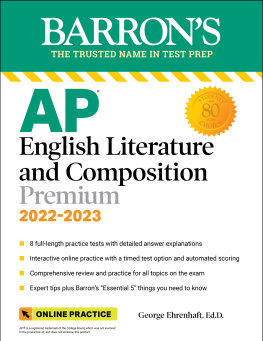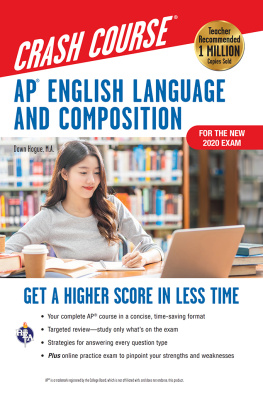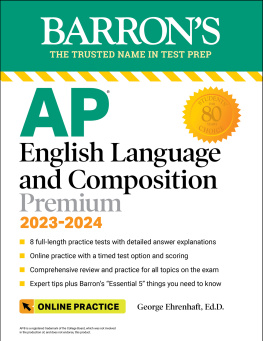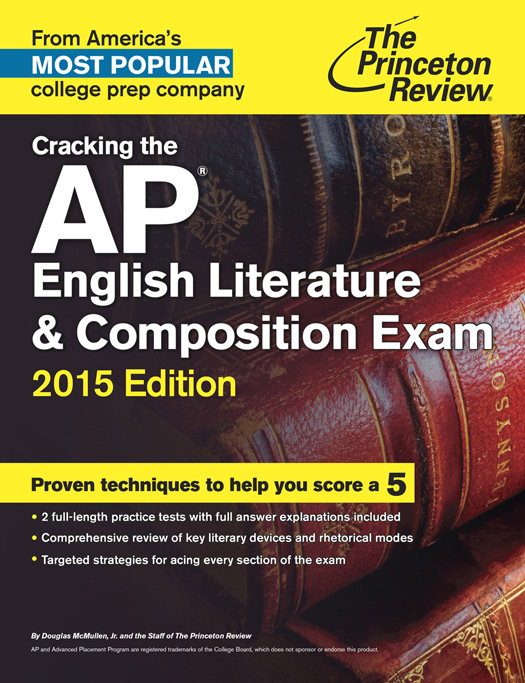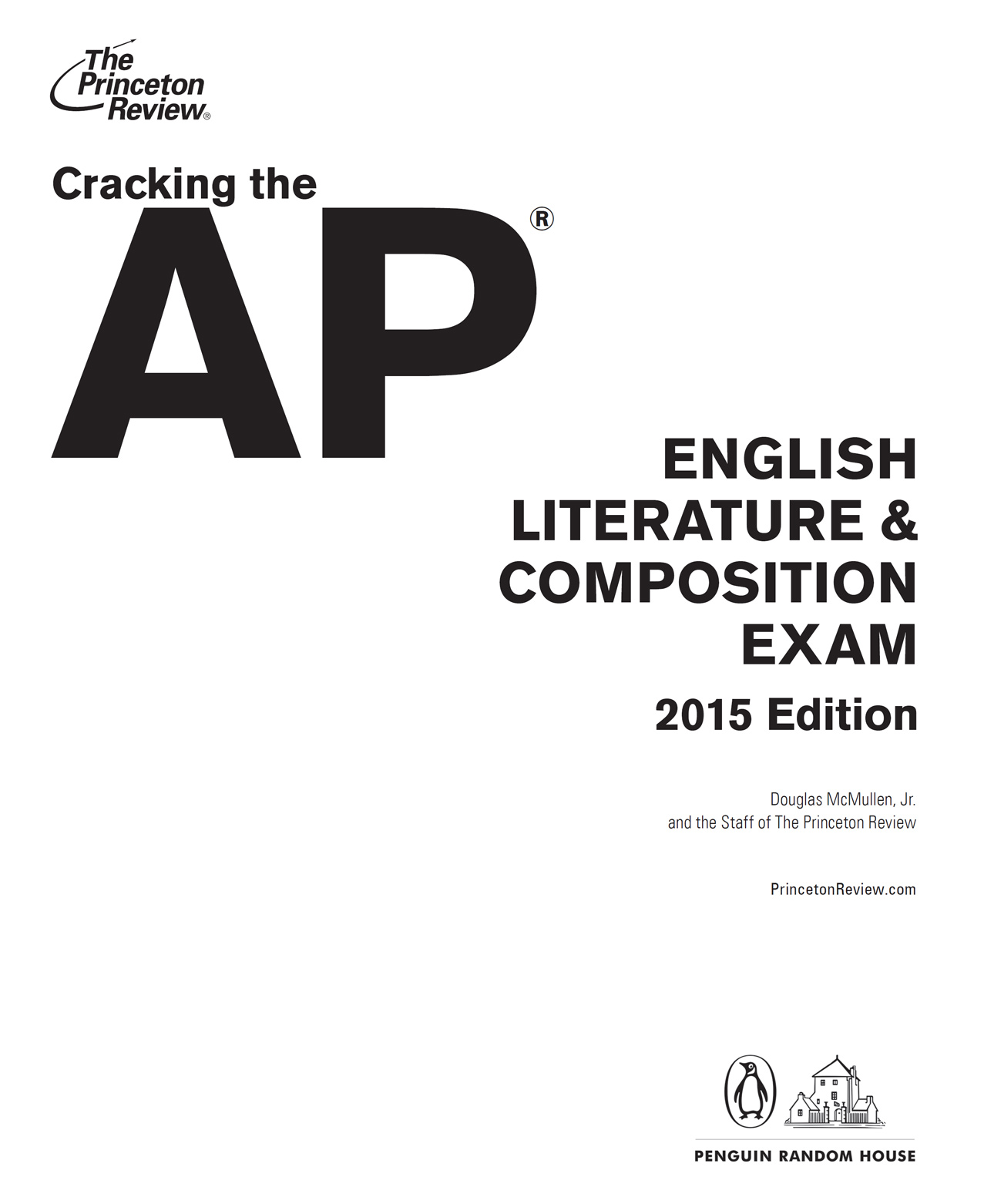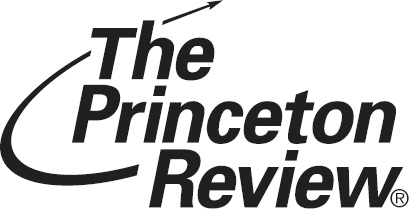Editorial
Robert Franek, Senior VP, Publisher
Casey Cornelius, VP Content Development
Mary Beth Garrick, Director of Production
Selena Coppock, Managing Editor
Calvin Cato, Editor
Colleen Day, Editor
Aaron Riccio, Editor
Meave Shelton, Editor
Alyssa Wolff, Editorial Assistant
Random House Publishing Team
Tom Russell, Publisher
Alison Stoltzfus, Publishing Manager
Melinda Ackell, Associate Managing Editor
Ellen Reed, Production Manager
Kristin Lindner, Production Supervisor
Andrea Lau, Designer
The Princeton Review
24 Prime Parkway, Suite 201
Natick, MA 01760
E-mail:
Copyright 2014 by TPR Education IP Holdings, LLC. All rights reserved.
Cover Art Douglas Pulsipher/Alamy
Published in the United States by Random House LLC, New York, and in Canada by Random House of Canada Limited, Toronto.
A Penguin Random House Company.
next to of course god america I, 1926, 1954, 1991 by the Trustees for the E. E. Cummings Trust. 1985 by George James Firmage, from Complete Poems: 19041962 by e. e. cummings, edited by George J. Firmage. Reprinted by permission of Liveright Publishing Corporation.
Siren Song from Selected Poems, 1965-1975 by Margaret Atwood. 1976 by Margaret Atwood. Reprinted by permission of Houghton Mifflin Harcourt Publishing Company. All rights reserved.
Excerpt from Libra by Don DeLillo, by Don DeLillo. Used by permission of Viking Penguin, a division of Penguin Group (USA) Inc.
Excerpt from Ultramarine reprinted by permission of The Peters Frasers and Dunlop Group Limited, on behalf of as printed in the original volume.
Woodchucks, 1972 by Maxine Kumin, from Selected Poems 19601990 by Maxine Kumin. Reprinted by permission of W.W. Norton & Company, Inc.
eBook ISBN: 978-0-8041-2531-4
Trade Paperback ISBN: 978-0-8041-2530-7
The Princeton Review is not affiliated with Princeton University.
AP and AP Advanced Placement Program are registered trademarks of the College Board, which does not sponsor or endorse this product.
Editor: Colleen Day
Production Editor: Jim Melloan
Production Artist: Deborah A. Silvestrini
2015 Edition
v3.1
Contents
Authors Foreword
Throughout this book youll notice that when I refer to myself, I say we. Im not the Queen of England, and this isnt the royal weits just that The Princeton Reviews test-taking techniques are the refined product of hundreds of smart people spending thousands of hours figuring out how best to teach standardized tests. Saying we is a matter of giving credit where its due. Just this once, though, Id like to step out of the collective shadows and say a few personal things about the book youre reading.
Because youre reading this book, chances are good that youre a high school student studying English literature. I was once where you are, and I never thought Id be here on the other side of the page, writing about English. In high school, I loved reading (that is, the books I wanted to read) and I sometimes even liked writing, but I definitely wasnt sure I liked studying English. It seemed to me that my teachers were bent on ripping literature into tiny little pieces so they could squint at the wreckage. My English teachers seemed like maniacs who spent their time shooting birds out of trees so that they could take a birds body, pluck its feathers, cut it open, and talk about its intestines. I just wanted to listen to the birds sing. At the time, I was sure I had the better attitude. But now look at me, carving into books and poems as if they were cooked turkeys and serving them up, supposedly for your benefit.
Well, it is for your benefit: first and foremost to help you on this testbut theres much more than that. Reading poetry and fiction is an artnot a skill, an art. If youd told me when I was 15 that I didnt really know how to read fiction I would have laughed at you. But, if youd told me I didnt know how to read music or how to play the violin, well, it would obviously have been true.
When it comes to literature, great authors are great composers and you, the reader, are the violinist, the pianist, the conductorthe whole orchestra. The difference is that the performance is one only you can hear, and only you can really know how well youve played the piece. It takes years of practice and study to read (or write) truly well, just as it does to master a musical instrument. Theres no shame in being less than perfect. Youll know when you get it rightit will sound right inside. That maniac English teacher is just a stern piano instructor, making you practice your scales over and over again. Does it get boring? Yes. Does it seem totally pointless at least half the time? Yes! Is it fun? No, not reallyexcept that every now and then you discover that you can play a new, harder piece just right. When you realize, Hey, all this practice is starting to pay off! its exciting. Ill bet youve already come across a piece of literature thats made you sit up and say, Wow, there really is something special about this book. I want to remind you that English teachers are not part of a secret conspiracy to drive students crazy, and that theres a method (and a love of literature) behind your English teachers and my madness. When you get bogged down, remind yourself that the point of all this study is the mastery of an artintelligent reading and writingan art youll be able to use every day of your life.
This book is my small contribution to your career as a concert soloist in literature. Good luck. Who knows? Maybe Ill see you reading in Carnegie Hall some day.
Douglas McMullen, Jr.
Part I
Using This Book to Improve Your AP Score
PREVIEW: YOUR KNOWLEDGE, YOUR EXPECTATIONS
Your route to a high score on the AP English Literature and Composition Exam depends a lot on how you plan to use this book. Respond to the following questions.
- Rate your level of confidence about your knowledge of the content tested by the AP English Literature and Composition Exam:
- Very confidentI know it all
- Im pretty confident, but there are topics for which I could use help
- Not confidentI need quite a bit of support
- Im not sure.
- Circle your goal score for the Exam:



